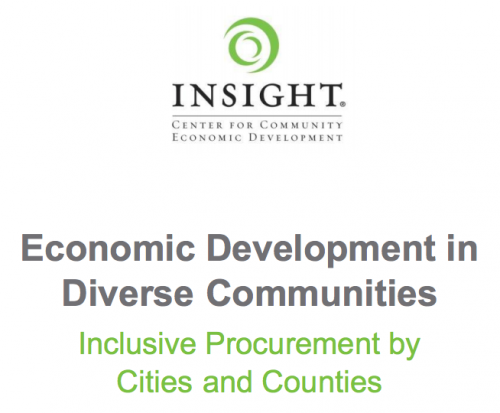This study examines 40 cities and counties across the United States, selected for their large population and geographic diversity, to determine trends and best practices in the administration of Minority- and Women-Owned Business Enterprise (MWBE) and Small Business Enterprise (SBE) programs. Our study underscores a dynamic reach, evolution, and impact of these programs toward regional economic vitality, and highlights a broad range of approaches that maximize their public benefits.
While a small number of select jurisdictions have scaled back or eliminated MWBE procurement programs in favor of expanding more generic small business support efforts, others have renewed or emboldened their programs. As a result, MWBE and allied SBE programs are increasingly robust fixtures of the American political economy.
Read More
Download the PDF
Report Summary:
This Insight Center study examines 40 cities and counties across the United States, selected for their large population and geographic diversity, to determine key National trends and best practices in Minority and Women-Owned Business Enterprise (MWBE) programs and Small Business Enterprise (SBE) programs.
The study reveals a dynamic reach, evolution, and impact of these programs toward regional economic vitality. MWBE and SBE programs help diverse and small business owners get a fair share of public contracting awards, by asking government departments to contract with them for goods and services when the owners are under-represented in awards. These inclusive business programs give preference points to MWBEs or SBEs when evaluating a contract bid, require contractors or suppliers to make a good faith effort to utilize diverse small business owners as sub-contractors, encourage diverse owners to bid on contracts, and build the capacity of small businesses.
These supports help to ameliorate historical and current discrimination and move businesses as well as the local economy toward a virtuous cycle of growth. Policies enacted over the past eighteen years in six states have decoupled local procurement programs from racial or other group preferences, and have left some observers with the impression that racial and gender diversity are diminishing focal points of attention and resourcing in local contract policy.
Our survey of the field, prepared by Insight Center senior consultant Tim Lohrentz with major contributions from Insight senior consultant Aimee Chitayat, tells a more nuanced story. Our findings reveal that MWBE programs are an embedded feature of public policy across the nation. The study finds that:
- Nearly 60 percent of the jurisdictions we surveyed for the report are committed by policy and practice to MWBE programs. Of the 20 cities surveyed, three out of four support some form of MWBE program. These percentages have remained relatively stable over the past five years.
- Small Business Enterprise (SBE) programs, which may complement MWBE goals but are more generally targeted, are on the rise over the past five years
- About 90 percent of jurisdictions have SBE and/or MWBE programs
- In states that prohibit direct preferential policies, local jurisdictions have evolved to develop voluntary and indirect policies that support opportunity for historically disadvantaged communities.
- Best practices are emerging from this work that are generalizable and can enhance program effectiveness, sustainability, and public support
Table of Contents:
- Executive Summary
- Introduction
- Report Significance and Organization
- Methodology
- Legal History and Backdrop
- Trends in City and County Inclusive Procurement Programs
- Key Components of Race-Conscious MWBE Programs
- Key Components of Race-Neutral MWBE Programs
- Key Components of Small Business Enterprise (SBE) Programs
- Best Practices in Common across All City and County Inclusive Procurement Programs
- Promising Practices in Small Business Capacity-Building
- Conclusion
- Appendix 1 – List of 20 Cities and 20 Counties in the Study
- Appendix 2 – Definitions
- Appendix 3 – Tables of Program Components





